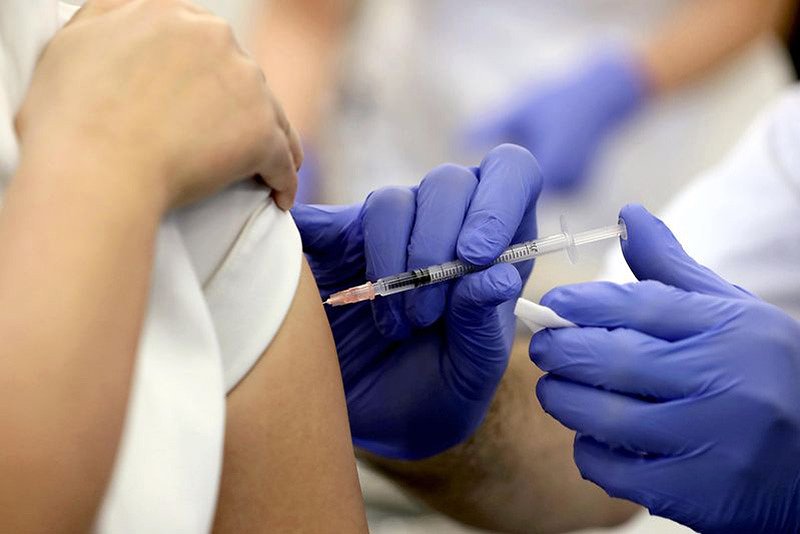
A person receives a COVID-19 vaccine booster shot at the Tokyo Medical Center of the National Hospital Organization, in Meguro Ward, Tokyo, on Dec. 1.
18:17 JST, December 16, 2021
The Health, Labor and Welfare Ministry approved Thursday the use of the Moderna COVID-19 vaccine in the booster campaign.
To expedite the rollout, people who received Pfizer shots for their first and second doses might be offered Moderna jabs for their booster and vice versa, according to the government’s plan.
However, with fears growing over the omicron variant, it is necessary to eliminate misunderstandings and resistance regarding mixing and matching doses to ensure the smooth rollout of the booster campaign.
“There is more demand for the Pfizer vaccine among residents,” said a municipal government official in Harima, Hyogo Prefecture, where preparations for the booster campaign are underway.
The central government plans to roll out booster doses to municipalities by next March, of which 60% (or about 24 million doses) will be the Pfizer vaccine and 40% (or about 17 million doses) will be Moderna doses.
The central government is asking local governments to mix and match vaccines, as demand for the Pfizer vaccine is expected to exceed supply. It hopes the measure enables municipalities to expedite their booster campaigns to mitigate the threat of the omicron variant.
About 10,000 Harima residents, including medical service workers and elderly people, will be eligible to receive a booster shot by next March.
Most of the fully vaccinated residents received the Pfizer vaccine for their first and second shots, but about 40% are expected to be offered a Moderna shot for their third dose. However, some residents say they do not want the Moderna vaccine, according to town officials.
None of the medical institutions in the town have administered Moderna shots so far, as hospitals have also shunned the U.S. firm’s vaccine.
Resistance to mixing and matching vaccine doses and concerns about side effects associated with the Moderna jab — such as arm swelling, fever and myocarditis — are thought to be behind the situation.
“The booster campaign will be delayed if Pfizer doses run out and people refuse to receive Moderna shots,” a municipal official said. “We want the central government to supply as many Pfizer doses as possible.”
Concern has also been expressed in other municipalities. “There might be people who feel they don’t need to get the booster if it isn’t Pfizer,” a Hiroshima prefectural official said. “We want to emphasize the effectiveness of booster shots.”
Hideo Ueichi, an associate professor at the University of Tsukuba and an expert on risk cognition, said, “As this is the first time we are grappling with the issue of mixing and matching vaccines, anxiety and misunderstanding can easily occur. Thorough information must be provided.”
A side effect that some elderly people have expressed concern about is myocarditis, but it is very rare and mainly affects males aged 10-29.
The incidence per million males in the age group is 54.9 for the Moderna vaccine and 14.5 for Pfizer’s. However, the majority of cases that have occurred have been mild.
Many experts agree that, excluding young males, there is no difference between the two vaccines in terms of efficacy and safety.
The risk of developing myocarditis is much higher among those who are hospitalized with COVID-19.
Regarding side effects following booster shots, a health ministry official said, “It has been confirmed that the adverse reactions are at the same level as those that can occur after the second shot.”
It has also been suggested that the protection offered by mixing and matching vaccine doses is on par or even higher than that offered after receiving three doses of the same vaccine.
According to the provisional results of a U.S. study, among recipients who had received the Pfizer vaccine for their first and second doses and Moderna’s for their third dose, the amount of neutralizing antibodies they produced was 31.7 times higher compared to just before the third shot, while it was 20 times higher for people who had received three doses of the Pfizer vaccine.
North America and European countries have already started mixing and matching vaccine doses and the European Medicines Agency issued a statement on Dec. 7 acknowledging the efficacy of the approach.
Boosters are said to be effective even against the omicron variant.
While protection may have decreased to as low as 35% for people who have received two doses, boosters offer 70-75% protection, according to British health authorities.
“Two doses of the COVID-19 vaccine are not enough to cope with the omicron variant,” said Kagoshima University Prof. Junichiro Nishi, an infectious disease expert. “It is necessary to push ahead with the booster campaign regardless of the vaccine type, starting with those with a higher risk of becoming seriously ill, such as people with immune deficiency, senior citizens and people with preexisting medical problems.”
Top Articles in Society
-

Man Infected with Measles Reportedly Dined at Restaurant in Tokyo Station
-

Man Infected with Measles May Have Come in Contact with Many People in Tokyo, Went to Store, Restaurant Around When Symptoms Emerged
-

Woman with Measles Visited Hospital in Tokyo Multiple Times Before Being Diagnosed with Disease
-

Australian Woman Dies After Mishap on Ski Lift in Nagano Prefecture
-

Foreign Snowboarder in Serious Condition After Hanging in Midair from Chairlift in Nagano Prefecture
JN ACCESS RANKING
-

Japan PM Takaichi’s Cabinet Resigns en Masse
-

Japan Institute to Use Domestic Commercial Optical Lattice Clock to Set Japan Standard Time
-

Israeli Ambassador to Japan Speaks about Japan’s Role in the Reconstruction of Gaza
-

Man Infected with Measles Reportedly Dined at Restaurant in Tokyo Station
-

Videos Plagiarized, Reposted with False Subtitles Claiming ‘Ryukyu Belongs to China’; Anti-China False Information Also Posted in Japan





















